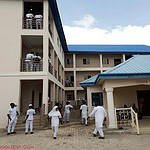TSCNM Jalingo Community Midwifery Programme Admission for 2025/2026
Taraba State College of Nursing and Midwifery has opened its 2025 Community Midwifery admission form. This guide covers who can apply, how to register, and what to bring for the test. If you’re eligible and interested, don’t wait too long.

Admission Form Is Out
The Taraba State College of Nursing and Midwifery (TSCNM) has started selling forms for its 2025/2026 Community Midwifery programme.
If you’re from Taraba and want to work in the healthcare space, this could be your entry point. The form is only open for a short time, so you’ll need to act fast.
Form sales run from 21 July to 31 August 2025.
Who Can Apply?
To be considered, you must:
- Be from Taraba State
- Have at least 4 credits in your O’level results (WAEC, NECO, or NABTEB)
- These credits must include English Language and Biology
- All results must be from no more than two sittings
Cost of Form
The application fee is ₦10,000. It’s not refundable, so make sure you meet all requirements before paying.
How To Apply
- Go to the TSCNM application portal
- Create an account with your email and phone number
- Log in using the details you just created
- Pay the ₦10,000 fee with your ATM card
- Fill the form and check for errors before submitting
- Use a scratch card or result-checking PIN that hasn’t been used more than three times
- Print these:
- Payment slip
- Filled application form
- Acknowledgement letter
Screening and Test Day
The college has scheduled the physical screening and aptitude test for:
- Date: Thursday, 5 September 2025
- Time: 8:00 a.m.
- Venue: College premises
What To Bring:
- Original and photocopies of your O’level results
- The printed application form, payment slip, and acknowledgement letter
- Result-checking PIN or card
- National ID card or slip
- Writing materials
Show up early and come fully prepared. Nobody wants last-minute drama on test day.
Questions?
For help, reach out via:
08064577138
07089335964
07030376974
Share This Post: If this post helped you, share it with others! Use the buttons below to spread the word!
More Articles:
- Taraba State College of Nursing and Midwifery (TSCNM) Community Nursing Programme Admission Form for 2025/2026 Academic Session
- Taraba State College of Nursing and Midwifery (TSCNM) Post Basic Nursing & Post Community Nursing/Midwifery Programmes Admission Form 2025/2026
- Kariyoma College of Nursing Sciences gets approval to operate: ND Nursing Sciences Interim Accreditation
- Akwa Ibom State College of Nursing Sciences (AKSCONS) Post Basic Psychiatric Nursing Form 2026: Registration Dates and Requirements
- Edo State College of Nursing Sciences (EDOCNS) Extends Community Nursing and Midwifery Form Deadline 2026/2027: New Closing Date
- Aliko Dangote College of Nursing Sciences, Bauchi Opens Direct Entry Midwifery Form for 2026/2027
- Standard College of Nursing Sciences, Minna Post-Basic Midwifery Form 2026/2027 (N30,000)
- ECWA College of Nursing Sciences, Egbe Post Basic Nursing Admission 2025/2026







